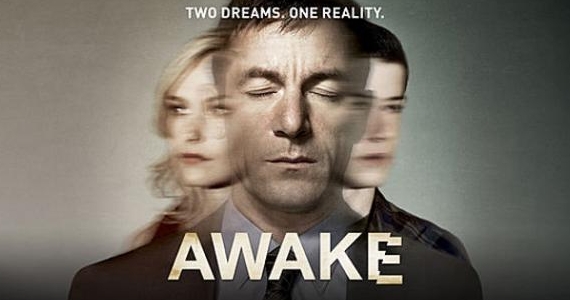Worst case scenario: Awake’s pilot is an amazing 45 minutes of television. Best case scenario: it’s the beginning of a show that has the potential to help redefine the form and function of network serial drama.
Awake’s premise is deceptively easy to explain: Detective Michael Britten and his family get in a car accident. After the crash, Britten’s reality is seemingly split into two worlds, one where only he and his wife survived, and another where only he and his son did. Awake juggles these two universes effortlessly, throwing up signposts, such as Britten’s color coded wrist bands, so the audience will know what reality he’s currently experiencing. Still, a question constantly plagues the viewer: what is real?

I hope Awake’s answer is “you’ll never know”. In a meeting with one of his therapists (Britten has two, one in each reality), Britten confesses that he has no desire to ever know what’s real if it means he has to lose one of his family members. This is one of a few lines in the pilot that suggests Awake might not be out to solve the mystery that underlies its narrative. Instead, Awake might ask us to simply accept Britten’s curious circumstances as part of the storyworld in the same way that we accept True Blood’s Bon Temps is full of vampires and werepanthers and that The River’s Amazon is permeated by magic. I think this approach, if taken, will help Awake keep its head above the ratings water.
As I’ve discussed in recent posts and as others have endlessly debated, the recent flood of mythology driven shows on network TV is a double-edged sword. When it works, it’s amazing. When it fails, it’s also amazing, but in more of a train wreck kind of way. While Awake’s creator Kyle Killen is clearly a smart guy (his other show about a man with a double life, Lone Star, was short-lived but outstanding), and would probably be capable of spinning out a complicated mythology, I’m hoping he’s chosen not to. Awake as a mythology-based show would be difficult to sustain. How long could they keep the mystery engaging without coming to a conclusion? Awake as a procedural with a twist, on the other hand, is much easier to maintain.
Much of the pilot is devoted to two cases that Britten is trying to solve, one in each reality. His access to both realities becomes a kind of gift, a fresher version of the psychic ability that pops up in many cop dramas, that allows him insight into each of the crimes. As shows like CSI and NCIS demonstrate, the procedural angle is much more accessible for most viewers, which could help Awake find an audience. This doesn’t mean Awake has to lose its edge or intelligence, though. I think those qualities are part of the show’s DNA and will shine all the brighter couched in a procedural, which allows for more room for character development than a complicated mythology that demands as much attention as the characters.
Luckily, Awake has a deep well of complicated characters, situations, and relationships to plumb. To me, a character driven show about what happens to a family dynamic when that family is split into two realities sounds much more interesting than answering why Britten is or isn’t crazy. I hope Awake is strong enough to not listen to the fans that clamor for the mystery to be solved, and if it chooses to ignore them, I hope the fans will be smart enough to realize what a good choice it was.
Other thoughts
Awake’s pilot is still free to watch online here.
Britten’s son, Rex, is a nice change from the likes of Josh on Terra Nova. Rex is still a goofy name, though.
Jason Isaacs is an outstanding actor (duh), and I’m excited to see him on the small screen not playing a bad guy.
I have a major girl crush on Laura Allen. Who doesn’t, though?

 New Girl is arguably the break out comedy hit of the Fall season. It might not have the strongest ratings, but it has the most buzz. It’s a show that polarizes its audience; you either love it or you hate it, but you can’t ignore it. Those who consider New Girl an all shtick-no-substance show will probably write its recent Golden Globe nomination for “Best Comedy” off as a bad pick, but I think there’s more to New Girl than hollow hijinks and made up terms like “adorkable” and “gumbo pod”.
New Girl is arguably the break out comedy hit of the Fall season. It might not have the strongest ratings, but it has the most buzz. It’s a show that polarizes its audience; you either love it or you hate it, but you can’t ignore it. Those who consider New Girl an all shtick-no-substance show will probably write its recent Golden Globe nomination for “Best Comedy” off as a bad pick, but I think there’s more to New Girl than hollow hijinks and made up terms like “adorkable” and “gumbo pod”.
